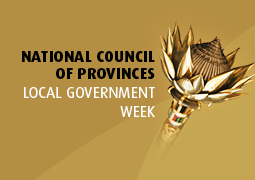
Parliament, Wednesday, 09 September 2020 – National Council of Provinces (NCOP) Chairperson Mr Amos Masondo urged participants at the Local Government Week (#LGW2020) yesterday to take some responsibility for the state municipalities are in.
The weeklong #LGW2020 held in partnership with the South African Local Government Association (SALGA) under the theme: “Ensuring Capable and Financially Sound Municipalities”, kicked off yesterday with presentations from the Department of Cooperative Governance and Traditional Affairs, Department of Finance, and the South African Auditor-General.
Speaking at the opening of the four-day virtual #LGW2020 Mr Masondo said: “We … cannot claim innocence, when the Auditor-General makes the critical observation that over the past three years there have been serious weaknesses in the financial management of local government.”
Mr Masondo said the hosting of the Local Government Week gives effect to the constitutional mandate of the NCOP, which ensures that the provincial interests are taken into account in the national sphere of government.
“As the NCOP we are also charged with the task of making sure that, through organised local government, space is provided for the participation of local government representatives in our proceedings,” he said.
Mr Masondo emphasised that given the NCOP’s character and design, the House is better placed to facilitate co-operative government in a manner that allows local government to receive the necessary support in order to be able to perform its functions effectively.
Addressing the session on the challenges and opportunities of local government in advancing the fundamental tenets of a developmental state, Cooperative Governance and Traditional Affairs Minister, Dr. Nkosazana Dlamini-Zuma said, COVID-19 is amongst the challenges that are putting more pressure and crippling the local government sector further.
“The virus reached our shores when our economy was in decline with unemployment, inequality, and poverty reaching unprecedented highs since democracy. The pedestrian growth we have registered over the past decade simply was not enough to ensure employment and income for a majority of our people,” said Dr. Dlamini-Zuma adding that this, in turn, had an adverse impact on the local sphere of governance with many households struggling to keep up with payments for services.
“This resulted in households owing over R127,7 billion to municipalities at the end of the municipal financial year in June. Slowed business activities, tax evasion and inadequate collection systems resulted in a total debt of R181,3 billion of which R28,9 billion was owed by businesses and R18,1 billion by government in all its spheres at the end of the Municipal Financial Year,” she said.
Dr. Dlamini-Zuma told participants at the #LGW2020 that the financial woes and the mismanagement of some of the municipalities have led to the deteriorating state of municipal finances. The Auditor General’s report shows that 43% of our municipalities received an unqualified audit outcome, with only 11% of them receiving no findings. 28 of our municipalities did not submit their reports on time. 91% of municipalities did not comply with legislation, pointing to a lapse in oversight and the lack of controls particularly as it relates to supply chain management and procurement. Dr. Dlamini-Zuma emphasised that this historical matter is at the core of the mismanagement of resources related to the fight against COVID-19 which has seen the state pay up to 5 times the value in certain products especially the Personal Protective Equipment, she said. “These matters of mismanagement, highlight long-standing challenges that have not been addressed in the local sphere,” she added.
SALGA President, Councillor Thembisile Nkadimeng said, as the local government sector they hope that the discussions of the next three days will provide an opportunity to propose lasting, practical and sustainable solutions to address challenges facing the municipalities. “While it is true that a number of serious and complex challenges persist in some municipalities, by and large, local government has delivered quality services and a better life for the majority of our people. Official statistics show that tremendous progress has been made particularly in historically neglected areas like former homelands, despite the reality that municipalities are continually chasing a moving target due to our population growth and in-migration rapidly giving rise to new settlements,” she said.
Speaking on improving the State of Local Government Revenue, Deputy Finance Minister Dr. David Masondo said, the interventions on issues facing the local government can be grouped into three areas, such as the administrative, structural and political/people challenges. Dr. Masondo told the delegates that approval of unfunded budgets is one of the main contributing factors to the financial distress faced by the municipalities. “Many municipalities approve budgets that are not credible and not based on realistically anticipated revenue and expenditure. By so doing, they effectively begin their financial years through failure,” he said.
Dr. Masondo said the solution to this problem is that municipalities should only budget for and spend revenue that they received or which they are realistically likely to receive. He told the delegates that these views and solutions have been constantly echoed but they are not implemented by the municipalities. “We are not giving up, we are working very hard as the National Treasury on assisting municipalities, in ensuring that their budgets are funded and that they stop spending money that they do not have,” he said.
Further priorities are to ensure that municipalities implement credit control practices. A financially sustainable municipality must be able to balance its revenue inflow and outflow, Dr. Masondo added.
The #LGW2020 programme enters its second day today and will continue until Friday. Today’s session deals with, amongst others, the nine local government MEC’s presenting on plans to improve service delivery, financial management and develop capacity in the local sphere of government, especially in Municipalities under Section 139 (with repetitive disclaimed audit opinions).
ISSUED BY THE PARLIAMENT OF THE REPUBLIC OF SOUTH AFRICA
Enquiries: Moloto Mothapo 082 370 6930

